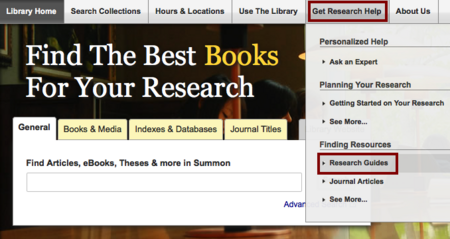Library:How to Find Articles/On a topic
On a Topic
There are two basic ways to search for articles on a topic. Searching Summon is quick and easy but has a number of limitations. Searching within specific databases is more time consuming but is also more precise and comprehensive.
General Search (Summon)
Searching Summon is fast and easy but has some limitations. Summon contains content from hundreds of databases which means that it includes articles from most subject areas, however, Summon doesn't include everything so you may be missing out on some articles relevant to your research. Furthermore, Summon lacks many advanced search features that individual databases provide. If you need to do a comprehensive and precise search you should search in specific databases and indexes.

To learn about searching in Summon, watch the following video:
Tips for Finding Articles
|
Specific Search (Databases)
Searching one database at a time can be more time consuming but is also more precise and comprehensive. Some of the advantages of searching within databases include:
- Databases usually only include content from a specific discipline (E.G. Psychology, Medicine) so you're less likely to get irrelevant results.
- Databases usually let you search by more specific characteristics, such as journal name, age/sex/gender of subject, research methodology, geographical location of research subjects, etc.
- The ability to do complex searches
Choosing a Database
To find a database in your subject area, search the Indexes & Databases portal or look at the Research Guide for your discipline or topic. Research guides are written by subject librarians to bring together the best sources on a subject in one place.

Enter the general term for your subject, e.g. physics. You may retrieve more than one guide: choose the guide that seems best for your research, e.g. Engineering Physics
Once inside the research guide, look for a tab labeled Articles or Indexes and Databases or Getting Started. This will provide you with a list of databases you can search for subject specific articles.
To learn more about database searching, go to the Searching in Databases guide.
Full Text Online
- Look for terms like "Link to full text", HTML Full Text, PDF, UBC eLink, for example :

- If you don't see a link to PDF or HTML, but there is a "UBC elink" button click on that to see if we have full text. If UBC Library subscribes to the online version of the journal, you'll see this:

3. Try searching for the title of the article in Summon. If the title is generic you may have to put it in "quotations"
4. If you still can't find the full-text of the article, you can go to a library and ask for help or use our Interlibrary Loan Service to get the item from another library.